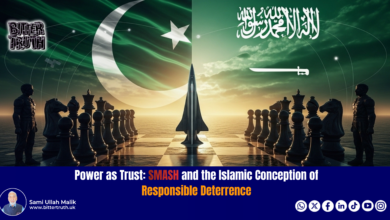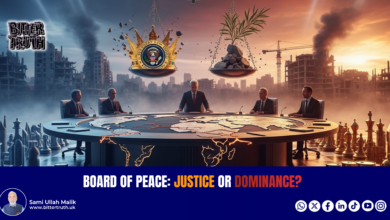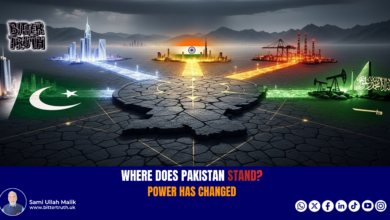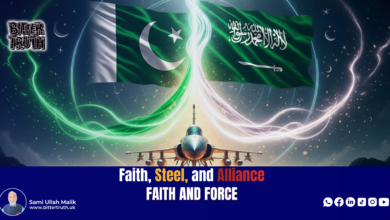The American War Mafia and World Peace
U.S. President Jimmy Carter said in a State of the Union address in 1980 that “if any foreign power intervenes to take control of the Persian Gulf, the United States will retaliate to protect the free movement of oil in the Middle East.” Carter and his successors have always kept that promise. White House claims that the United States not only increased the capabilities of the US military in the region, but also defeated Iraq by participating in the Gulf War by pretending to prevent Iraq’s Saddam Hussein from occupying the oil supply line. Although the United States had many other interests in the Persian Gulf, including preventing nuclear proliferation, counterterrorism, and promoting democracy, America’s most important interest was to continue the delivery of oil without interruption, while the American narrative proved that America’s presence in the region is subject to its own special interest’s world order, the rest are excuses.
America’s commitment to the Persian Gulf has never faced any major opposition. Even those who have been opposed to America’s various alliances in Europe and Asia and have called these alliances a burden on the country’s economy, have always agreed that America should keep the responsibility of protecting the Persian Gulf because one-third of the world’s oil is produced from this region. But now dramatic changes have taken place in the world. During the Cold War, the biggest threat to U.S. interests in the region was the Soviet Union. U.S. policymakers were worried that if the Soviet Union was able to cut off oil supplies, the U.S. military, which relies on oil and gas, would not be able to win a major war in Europe. But the collapse of the Soviet Union changed the nature of U.S. interests in oil supplies. While both national security and prosperity depended on the security of the Persian Gulf, it is now only associated with prosperity, which has had a profound impact on U.S. policy.
The absence of a national security factor has increased the military’s intervention in the Persian Gulf, as most Americans do not consider putting the military in trouble to defend their economic interests. So here the question arises, is the Persian Gulf oil so valuable that it should be defended by US military force?
In order to get the answer to this question, the answers to four more questions must be obtained. First, if the United States ends its commitment to the Persian Gulf, how likely is it that there will be a major obstacle to the flow of oil from the Persian Gulf? Second, how much will this obstacle affect the American economy? Third, how much military spending does the US spend on protecting oil from the Persian Gulf? Finally, what are the non-military alternative means of securing the Persian Gulf and what would the costs be? It is likely that the costs will exceed the benefits of this policy. This is the time when the US should end its military engagement in the Persian Gulf and invest in alternative sources of oil supply disruptions. In a decade or so, when the region will have become more dangerous than it is today, the United States should be in a position to completely end its military involvement in the Persian Gulf.
Before properly reviewing the current policy, it is necessary to remove a misunderstanding. Politicians and analysts are often seen saying that in order to avoid the risk of any disruption in the oil supply system, the United States must increase oil production so that the dependence on imported oil is less than normal, that is, the energy sector is sovereign. This argument basically shows the incomprehension of the global oil market system because sovereignty does not matter in the trade of exchangeable commodities. In fact, oil is bought and sold in the global market, so its price in the United States is linked to the price of oil worldwide. The example of the global oil market is like a water tub, which has many taps to pour water and many drains to drain it. Therefore, it does not matter how much water comes from a single tap and how much water flows through a particular drain. In the supply and demand-dependent oil market, oil supply is more important because if the supply of oil decreases rapidly, then all the consumers who get water from the tube will be affected. Therefore, even if America’s oil imports from the Persian Gulf are zero, the United States will not be able to remain affected by the changes in oil prices if the supply of oil from the Persian Gulf is affected.
It may be thought of how oil supplies could be affected if the US leaves the region, but none of these considered options seem viable. One possibility that can be considered is that if a Gulf country occupies most of the oil reserves in the region by occupying its neighbouring countries, then it can try to control the prices in the global oil market and any such move will be tantamount to challenging the power of major oil consumers such as Britain and America, but this option is by no means possible, because there is no country with so much power in the region. Iraq has been devastated since the US invasion and is still in the grip of anarchy. Iran has been weakened by Western sanctions and its leaders are busy dealing with internal problems. Saudi Arabia has been benefited from the results of achieving its goals by trapping it in the war in Yemen, and finally the Saudis have also taken enough steps to get rid of this crisis and now they are also not interested in conquering the region.
Another hypothetical situation to consider is that an indirect war to take control of the region could plunge gulf countries into chaos and anarchy and destroy basic infrastructure, affecting oil supplies by ship. But there are a number of factors that hinder this hypothetical situation. There is no state in the region that risks such a big war to establish its monopoly. A country may try to capture another country, but that is also not an easy task. Iran and Saudi Arabia could have targeted each other, but both of them have been separated from each other by the Persian Gulf and China is still playing the role of a bridge of understanding between the two.
Iraq is relatively more vulnerable due to internal divisions and borders with Iran, but Iran itself faces numerous challenges and it is highly likely that it has learned a lot from the difficulties faced by the United States’ invasion of Iraq. In addition, the basic infrastructure of oil reserves is capable of working even during intense war, a clear example of which is the Iran-Iraq war of 1980, when the supply of oil decreased even during the intense war but continued and oil prices stabilized again within a short period of the ceasefire.
A third possible scenario could be for Iran to disrupt oil supplies from the Strait of Hormuz to put the United States and its allies in trouble. The Strait of Hormuz is a very narrow 21-mile stretch through which 20 million barrels of oil passes daily, which is about 20 percent of global production, even though the Iranian military is not able to completely close this route, but experts say that they can disrupt supplies by planting mines and missile boats. It will also be affected, and neighbouring countries will also react strongly to it. In fact, Iran has never tried to do so, not even during the Iraq War. There is no doubt that if the United States ends its commitment to the region, Iran may ever start considering this option, however, it seems understandable that after the US leaves the region, when Iran violates the nuclear deal, it should try to close the strait of Hormuz in response to the western sanctions imposed on it. All this will not be easy, but if the United States refuses to take the responsibility of protecting the Persian Gulf, then the possibility of this situation becoming a reality has increased when former US President Trump announced more sanctions to criticize Iran by unilaterally withdrawing in violation of the agreement with Iran, in response to which The head of Iran’s Atomic Energy Agency, Ali Akbar Salehi, informed the international media that Ayatollah Khamenei Iran has ordered the authorities concerned to step up their preparations for the enrichment, and the United Nations Atomic Energy Agency (IAEA) has also been informed that Iran will make more of the most important component of enrichment, the titanium hexafluoride. It would have taken six to seven years if it had worked normally, but now it will be ready in the coming weeks or months and now it can be said with certainty that Iran has completed its program.
After the dishonesty of the United States, the last possible risk that will disrupt the oil supply line could be that the internal conditions of a major oil producing country deteriorate to such an extent that oil production is affected. Saudi Arabia could be the target of this possible situation. Saudi Arabia not only produces more than 10% of global oil production, but it also has such large reserves that it is capable of affecting oil supply lines around the world. At the moment, its exports appear to be safe. The Saudi military is working to protect oil reserves and is doing this better. Therefore, any act of terrorism will likely fail.
The Saudi royal family is generally considered to be entitled to the kingdom. Most of the people of the country are benefiting from the wealth of oil and due to the tireless work and military skills of General Raheel and his other colleagues, the country’s army has also become more skilled than ever before. These are all the reasons that have saved Saudi Arabia from the effects of the Arab Spring in a timely manner. Moreover, in the event of a civil war, if a new power takes power, it will also have to continue producing oil because the country’s economy is completely dependent on oil production. Even if the United States ends its commitment to the Gulf, it can continue to train Saudi Arabia’s military for internal security, as well as the exchange of intelligence and the supply of weapons. In short, if the United States decides to end its military commitment to the region, the likelihood of oil supplies being affected, especially from the Strait of Hormuz, will be very small, but the question is, how expensive can such a disruption in oil supply be?
Experts’ predictions about the losses caused by any disruption in oil supply are quite dangerous. According to the latest figures, the reduction in global oil production by one percent will increase global oil prices by up to 8 percent. If these figures are taken into account, if 100,000 barrels per day of oil is undersupply due to a disruption, it means that Saudi exports fall to zero or oil supplies from the Strait of Hormuz are reduced by 60 percent, then global oil prices will double. The world has not faced any such obstacle yet, but in this case, it is difficult to estimate the loss and it is possible to increase the price even more. Oil prices will also have a profound impact on the U.S. economy. According to a conservative estimate, doubling the price of oil will reduce America’s gross domestic product by 3%, which is about $ 550 billion, and in the event of a major obstacle, such as the complete closure of oil supply from the Strait of Hormuz, its losses will be equally dangerous.
But its real impact on the United States will be much smaller. Because in such a situation, the United States can use its petrol reserves. It can also use underground reserves to control prices. An estimated 700 million barrels of oil are in strategic petroleum reserves. In addition, more than four billion barrels of oil are also available with the member countries of the World Energy Agency. (This organization was established in 1974, with the aim of fighting together in the event of an oil crisis around the world). Even if oil supplies from the Strait of Hormuz are cut off for a long period of eight months, the 4 billion barrels of oil can meet the shortfall for eight months. In the event of such a crisis, the first one month is from the United States. It will extract 4 million barrels of oil per day, as will the member countries of the World Energy Agency. 5 million barrels per day of additional oil can be extracted from their reserves. China, which is not an International Energy Agency worker, but can also use its reserves, has 90 days of reserves according to its imports. All these figures testify that in the event of a major disruption in the supply of oil from the Persian Gulf, if the world adopts a strategy mutually, it can compensate for the daily losses.
To assess the economic benefits and disadvantages of the U.S. military presence in the Persian Gulf, it is important to review the costs of living there. There is a huge expenditure on keeping American warships active. Since the end of the Cold War, one of the Pentagon’s strategies of combating two enemies at a time is always planned in the Persian Gulf. The strategy of fighting on two fronts was adopted so that there would never be an opportunity for America to get so caught up on one front that opportunist other front take advantage by attacking. If the United States abandons the strategy of preparing for war in the Persian Gulf, then it is left with two options, one is to continue the strategy of fighting two enemies at the same time, but the other enemy is in another region, the second is that it adopts a strategy of one war at a time, but there is no region more dangerous than the Persian Gulf in this strategy where the presence can be maintained under this strategy.
It is difficult to accurately estimate the cost of us troops in the Persian Gulf, because the army there is being used in many other places. According to experts, if the United States adopts a war strategy, it is estimated that $ 75 billion will be saved annually, which is 15 percent of the defines budget. This money can be saved by reducing the number of soldiers, reducing the number of warships and reducing the number of weapons, but America’s commitment to the Gulf is not limited to reducing the number of soldiers. In this region, the United States has fought many wars directly or indirectly to protect its oil interests, for which it has paid a heavy price. When the United States participated in the Gulf War, the main goal was to continue the supply of oil.
Although the Iraq War was not fought for oil according to the US narrative, time proved that it was only to deceive the world, and the main reason for the stability and democracy seen in Iraq by policymakers was the oil reserves there. Therefore, ending the commitment to the Gulf will not only save dollars but also stop the loss of precious lives because now the countries of the region have understood the American deception.
At the end of this discussion, the question arises that what can be the alternative to the use of the army to protect the oil coming out of the Persian Gulf? In fact, the United States can use many non-military means to ensure the safety of this supply. On the one hand, the United States can increase its strategic oil reserves. For example, if the United States increases its strategic petroleum reserve by percent, it can meet global demand for a few more months in the event of a major disruption in oil supplies. And for this work, it will have to spend 10 to 40 billion dollars, which it can collect from the affected countries.
If we look at the demand for gasoline of The United States and European countries, most of them are busy looking for a replacement for petrol since the day when the late King Faisal announced not to sell petrol to the United States and its allies, after which there was a stir in the world. After that day, steps were taken to reduce the share of oil in the US economy under a special strategy but have not yet been able to find a complete replacement for petrol, but at the same time, the United States and Europe have adopted policies so that the economy is not affected by changing oil prices. In the United States, the transportation sector uses 70 percent of oil, so the process of paying special attention to this sector is increasing. All presidents, from George W. Bush to Obama, paid special attention to this issue, but Trump’s actions brought not only the region but the world to the brink of destruction. Défense and economic experts still advise aggressive policies to avoid these threats, warning the White House that the United States and its allies will have to take steps to reduce oil consumption on an emergency basis to avoid potential threats. For this, the tax rate on petrol will have to be increased so that the people increase the use of alternative sources.
According to American experts, there are some development expenditures that give long-term results, such as the research sector, if the government increases the amount allocated for the research sector, as a result, it is possible to reduce oil consumption in the country by 50% by 2035. It will be possible. Therefore, if the government spends 100-200 billion dollars in the next 15 years on sectors such as research, which is about 10 billion dollars per year, then the 75 billion dollars per year on the defence of Persian Gulf can be avoided.
In addition, the United States can take various measures to reduce the economic impact of any interruption in oil supply. They should increase their reserves significantly, because if they don’t do this, the United States will have to bear the burden alone in the event of a crisis. At the same time, Washington will increase the pressure on the Gulf countries to reduce their dependence on the Strait of Hormuz and the oil pipeline, which passes through the Strait of Hormuz. Increase their capacity and they can do this easily.
After evaluating the pros and cons of the presence of the US military in the Persian Gulf, those implementing the One World Order hope that the current strategy is not entirely wrong because it costs a lot to deal with fewer threats. But now the political, defense and According to the authors of the economic analysis, this relationship should end. From the point of view of national security, there is no fear of any major loss due to the disruption from the Persian Gulf. Economically, the country can withstand any disruption in the supply of oil and the dependence on this oil will be less in the future. It will happen. In the current situation, instead of maintaining its presence in the Persian Gulf, America will have to gradually put itself in such a position that it can end this commitment at any time. In the next two decades, more investments should be made to achieve self-sufficiency in oil. As the country’s reserves increase, energy efficiency increases and oil pipelines passing through the Strait of Hormuz become more efficient, the country will soon become self-reliant.
On the other hand, the Pentagon admitted for the first time that they had convinced Trump that after self-reliance in the matter of oil, the United States would have to maintain its commitment in the Gulf by keeping in front of the threats there. Among these threats, Iran is the most prominent. Is. They believe that after imposing more stringent conditions in the Iran nuclear deal, there is a strong possibility that the risks associated with it will continue to decrease. think of Because by doing so, it will have to lose a lot of income. Thus, when the threats from Iran will be reduced to non-existent and the United States will achieve self-sufficiency in oil, it will be responsible for protecting the oil supply line. Dari should be removed, but if Iran goes on the offensive, then America may face a difficult situation.
These days, the inner feeling of the American people is increasing that the United States should end its military involvement in the Gulf as soon as possible, which will significantly reduce its costs and change its priorities. On the other hand, if America maintains its military commitment, it will have to spend a large part of its defence budget in this regard. However, this decision will be based on the military priorities of the US in the Persian Gulf, among which nuclear proliferation is the most important. The surprising thing is that the decision makers have never questioned the presence of the military in the Gulf for decades despite this. That the need for an army in the Gulf has never been the same. Not reviewing this issue and not investing in its replacement is a big mistake. As a result of this mistake, where the US is losing billions of dollars, its army is also involved in an unnecessary war. If this white elephant is not rescued soon, this white elephant will start to crush the United States under its feet. After all these facts, Israel’s barbaric bombing of Gaza and the support of the White House, as the wave of public protest in the United Nations and in the United States itself, of course, is expected. It can be said that the time has come to bring down the American war mafia.
Saturday 21 February 2024
Lahore






